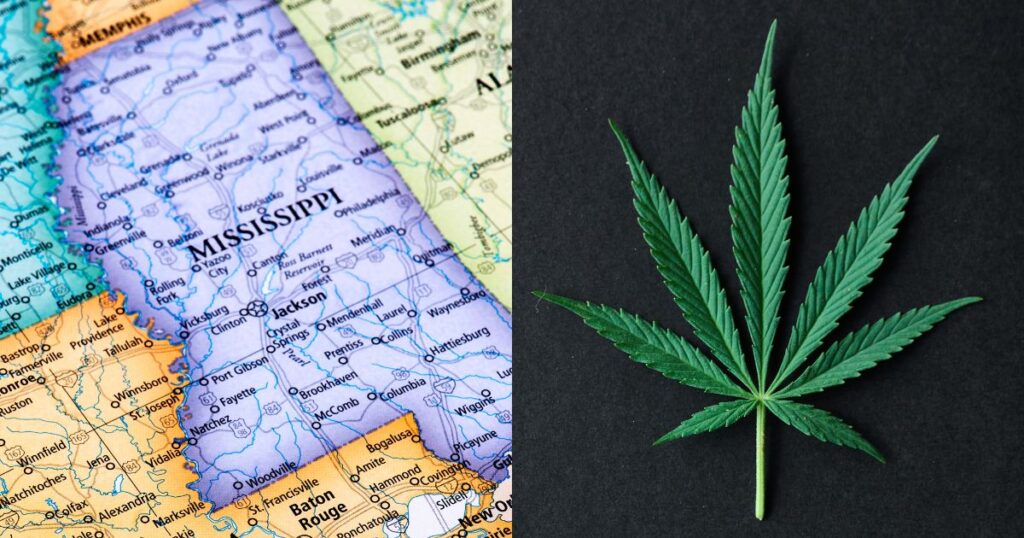The landscape of cannabis reform in the United States continues to evolve, and Indigenous communities are playing a leading role in shaping its future. Recently, the Mississippi Band of Choctaw Indians took a step forward by voting on a referendum to explore the potential legalization of medical or recreational cannabis on their lands.
The Mississippi Band of Choctaw Indians shared on their Facebook page the unofficial results of the referendum: 1,367 tribal members voted in favor, while 1,100 voted against. This moment signifies much more than just a tally of votes. It could be the possibility of a new chapter for the tribe, one that could set a precedent not only for tribal communities but also for the entire state of Mississippi.
The Cannabis Referendum Is A Step Forward For Mississippi
The referendum does not immediately legalize cannabis on Choctaw lands but opens the door for the tribal council to conduct feasibility studies and research the potential impacts of cannabis legislation.
This cautious, methodical approach ensures that tribal members have a voice in shaping the future framework while considering public health and economic feasibility.
Chief Cyrus Ben stressed the importance of this vote as a starting point, not an endpoint. “This vote does not mean dime bags will start selling on our streets the next day,” he remarked, according to an article from the Mississippi Free Press, emphasizing that the referendum merely allows for research to begin.
This calculated approach mirrors the steps taken by other Indigenous groups, like the Eastern Band of Cherokee Indians in North Carolina, which provides valuable insights into the potential future for the Mississippi Band of Choctaw Indians.
Learning from the Eastern Band of Cherokee Indians A Northern Parallel
The Eastern Band of Cherokee Indians (EBCI) offers an excellent case study for understanding the benefits and hurdles of cannabis legalization on tribal lands. Located in North Carolina, a state where cannabis remains illegal for both medical and recreational use, the EBCI has carved out its own path by leveraging tribal sovereignty.
The EBCI first approved a referendum for cannabis legalization in 2023, eventually opening medical and recreational cannabis sales within their territory. This move has not only provided their community access to cannabis but also created substantial economic opportunities.
With the Qualla Boundary dispensary leading the way, the tribe has fostered local job creation, revenue generation, and increased self-reliance.
The parallels between the two tribes are striking. Both operate within states with conservative cannabis laws and have used their sovereignty to challenge these limitations.
For the Mississippi Band of Choctaw Indians, the success of the EBCI demonstrates the economic and cultural potential of well-regulated cannabis programs.
Economic Potential on Sovereign Lands
One of the most compelling arguments for cannabis legalization is the potential for economic development. Across the United States, tribes participating in cannabis and hemp programs have experienced significant economic benefits.
Recent data shows that over 26% of federally recognized tribes are now involved in cannabis or hemp programs, underscoring the growing appeal of these industries.
For the Mississippi Band of Choctaw Indians, this could mean a diversified revenue stream to support essential community services like housing, education, and healthcare. Drawing from the success of other tribes, a cannabis program on Choctaw tribal lands could also:
- Reduce reliance on fluctuating federal funding.
- Stimulate local job creation within the tribe for positions in cultivation, retail, and compliance.
- Open avenues for partnerships with other tribal and non-tribal cannabis enterprises.
The tribe’s geographic positioning also creates a unique opportunity. Mississippi’s restrictive state cannabis laws mean that Choctaw lands could become a rare sanctuary for cannabis accessibility, potentially attracting significant consumer interest from surrounding areas.
Challenges That Lie Ahead
While the benefits are evident, implementing a medical or recreational cannabis program in Mississippi is not without its challenges.
Federal cannabis prohibition continues to create a legal gray area that complicates partnerships, investments, and banking solutions for tribal cannabis businesses.
Additionally, cultural and regulatory concerns within the tribe itself could pose obstacles.
Transparency and thorough feasibility studies will be key to navigating these challenges. By involving tribal members in decision-making processes and leaning on the experiences of tribes like the EBCI, the Mississippi Band of Choctaw Indians can create a program that reflects the needs and values of its community.
What This Means for Cannabis in Mississippi
Should the Mississippi Band of Choctaw Indians move forward with cannabis legalization, they could become the first jurisdiction within the state to allow recreational marijuana use.
This unique status would not only place them at the forefront of cannabis reform in Mississippi but could also influence statewide conversations around cannabis policy.
Mississippi recently legalized medical cannabis in 2022, but recreational use remains prohibited. By taking the lead, the Choctaw tribe may set an example for other jurisdictions, demonstrating the potential economic and social benefits of cannabis legalization.
Moving Forward Toward Economic Growth and Cultural Sovereignty
The Mississippi Band of Choctaw Indians’ referendum marks an important first step in a potentially transformative process. By drawing on the lessons of other Indigenous communities and approaching the matter with caution, they are setting the stage for what could become a model of economic growth and cultural sovereignty.
The tribe’s decision to methodically explore cannabis legalization highlights its commitment to making informed choices that serve its members’ best interests.
While there are challenges to overcome, the opportunities are vast—from economic revitalization to greater independence and self-determination.
As this story unfolds, it will be crucial for tribal members and observers to remain engaged, learning from both potential successes and setbacks.
One thing is certain. The Mississippi Band of Choctaw Indians is steering toward a future that prioritizes innovation, responsibility, and the well-being of its people.




















